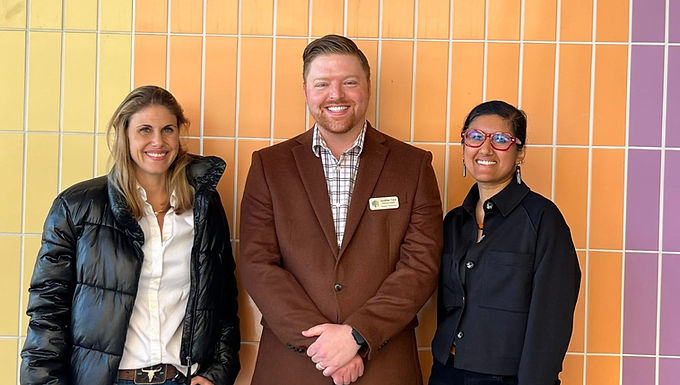Nur Kausar (right in the photo above) is business development manager at EAH Housing, a nonprofit that develops and manages affordable housing in California and Hawaii. A former journalist, she’s been on a mission to provide more affordable homes and keep Californians housed for more than a decade. She's had past roles at Housing California, the statewide advocacy organization, and California’s Department of Housing and Community Development, where she graudated from the Strategic CaseMaking™ curriculum.
We talked to Nur about showing people what solutions look like, what we lose if we don’t build the housing we need to sustain fragile communities, and storytelling as leadership.
What do you love about Sacramento?
I have lived in Midtown Sacramento for 10 years and love the trees, sunshine, walkability, bike-ability, and flora all four seasons. (The fauna can be tricky. Raccoons love to dig up our backyard fruit and veggie garden!)
I also love that even after a decade, I am constantly finding trails to walk, restaurants to try, and parks my kid has yet to conquer. It is both a vibrant urban city filled with festivals, sports, and farmers markets and a laidback town with peaceful retreats.
What’s your aspiration for your area, and California as a whole?
I aspire for the day when homelessness is rare and extremely brief, and that together we have prioritized ensuring every single person has access to a safe, stable home, or can get back into one quickly if they lose theirs.
What are some of the dominant narratives and other obstacles you’re navigating as you work toward bigger change?
I continue to hear the dominant narrative that homelessness is a personal choice or the result of something the person did to themselves. As an advocate and affordable housing developer, I try to pivot to the solution, and sometimes it’s as easy as giving someone a tour of one of our apartment buildings and having them meet the residents.
I also continue to hear the scarcity mindset around funding affordable housing. But we all know California is one of the largest economies in the world and capable of scaling up housing solutions.
I know as an advocate I can do a better job of using Strategic Casemaking™ principles to anchor those solutions and communicating to decision makers what we all lose if we sit on the sidelines. I already know the Sacramento I love is getting impacted by a lack of affordable housing because more neighbors have to sleep outside on our trails and more restaurants and local businesses are closing because workers can’t afford the high increase in housing costs.
How are you making the case for your vision of abundant housing?
I love the principle of anchoring and credentialing the solution, not the problem. I have learned from DrT that when you engage in a conversation, when you drop that anchor, drop it in positivity. Keep someone tethered to the solution, to the aspiration.
I love that, and one way I anchor people in solutions is by offering tours of affordable housing developments. As part of the Sacramento Housing Alliance Board of Directors and a developer myself, I partner with other developers, contractors, architects, and advocates to offer affordable housing bus tours, hard hat tours, and opportunities to attend events at our apartment buildings. I think showing what’s possible, where and why it works, helps make the case for more.
Would you share your best Strategic CaseMaking™ moment with us?
DrT taught me that loss aversion is the single dominating force in all of human decision making. I need to make clear what the audience I’m speaking to is going to lose if we don’t build affordable housing. I can’t take credit for the example that comes to mind but it was so impactful that I am replicating it in other parts of the state.
A few years ago, I visited the town of Paradise, California, which had been devastated by a massive wildfire. Thousands of people were displaced. The city rebuilt thanks to the support of all levels of government, community organizations, residents, and many more.
During my visit, one of the city staff stood on an empty lot in town, proudly holding up a sign that said “Affordable Housing Belongs Here.” Paradise could have been lost, ceased to exist, had it not been for people's resiliency and the dedication of many to rebuilding and welcoming residents new and old back.
We stand to lose great communities like Paradise if we don’t build the housing we need to sustain them.
What’s your favorite Strategic CaseMaking™ tool or skill?
I love collaboration, bringing people together for a common cause, and working together on solutions. My favorite tool is fostering collective ownership. As DrT says, “We are the ones we’ve been waiting for.”
How has Strategic CaseMaking™ changed your approach to leadership?
As a former communications practitioner, I see a lot of value in advocating for others to use to Strategic CaseMaking.™ I say this because organizations in the beginning would only send their communications staff to CaseMaking trainings, and I think the principles can be used by everyone, from executive leadership and boards of directors to new staff learning the ropes in all aspects of an organization.
I encourage people within my own organization and on the boards and committees on which I serve to take the practice of CaseMaking and of communications more seriously. DrT reminds us that people love and remember stories. They remember feelings. I think these are important lessons in leadership as well.
What are you working on next?
California, like the rest of the nation, faces a lot of uncertainty because of changes happening at the federal level. I’m working on sharing stories about how that uncertainty is impacting my work in developing affordable housing and the residents we are trying to house. I hope that by sharing solutions and a vision for a better future here at home, we can weather some of these challenges.

